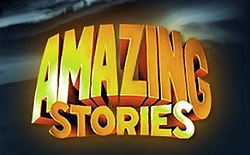Amazing Stories (TV series)
| Amazing Stories | |
|---|---|
 |
|
| Genre | Anthology, fantasy, horror, science fiction |
| Created by | Steven Spielberg (uncredited) |
| Developed by |
Steven Spielberg Joshua Brand John Falsey |
| Directed by | Various |
| Theme music composer | John Williams |
| Country of origin | United States |
| Original language(s) | English |
| No. of seasons | 2 |
| No. of episodes | 45 |
| Production | |
| Executive producer(s) | Steven Spielberg |
| Producer(s) | Brad Bird |
| Running time | 30 minutes |
| Production company(s) | Amblin Entertainment, Universal Television |
| Release | |
| Original network | NBC |
| Original release | September 29, 1985 – April 10, 1987 |
| Chronology | |
| Related shows | Family Dog |
Amazing Stories is a fantasy, horror, and science fiction television anthology series created by Steven Spielberg. It originally ran on NBC in the United States from 1985 to 1987.
The series was nominated for 12 Emmy Awards and won five. The first season episode "The Amazing Falsworth" earned writer Mick Garris an Edgar Award for Best Episode in a TV Series. It was not a ratings hit (ranking 40th in Season 1 and 52nd in Season 2), however, and the network did not renew it after the two-year contract expired. The 1987 science fiction movie *batteries not included was originally intended to be featured in Amazing Stories, but Steven Spielberg liked the idea so much that he decided to make it a theatrical release.
The series title licensed the name of Amazing Stories, the first dedicated science fiction magazine.
The series list below is annotated with the Book numbers as they appeared in the US release on VHS; the Japanese LaserDisc and UK VHS (PAL) releases are indicated with volume numbers. Note that Vol. 7 and 8 are switched for the UK VHS release. All episodes have a running time of around 25 minutes, with the exceptions of "The Mission" and "Go To The Head Of The Class" (both running 50 minutes).
In 1999 Varèse Sarabande released a CD containing a rerecording of the scores for the episodes "The Mission" and "Dorothy and Ben" (John Williams and Georges Delerue respectively) plus Williams' opening and closing themes, performed by the Royal Scottish National Orchestra conducted by John Debney.
...
Wikipedia
